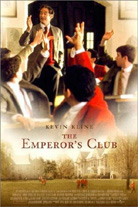The Emperor's Club
| Given its setting in an exclusive prep school in the nostalgic near-distant past and its focus on the role of a dedicated and inspirational teacher on the lives of a group of teenage boys, The Emperor's Club is not surprisingly being compared to Dead Poets Society (1989). However, the difference between the two films couldn't be more stark, particularly in the depiction of the teacher. Whereas Dead Poets Society was a thematic warning against conformity and rigidity, with Robin Williams' character embodying the power and pleasure of intellectualism without acquiescence to rules and preset boundaries, The Emperor's Club is the exact opposite. Kevin Kline stars as William Hundert, a gifted history teacher at the St. Benedict's School for Boys in the mid-1970s. Incredibly intelligent and passionately in love with the study of history, Hundert passes along his enthusiasm to his students, filling them with reams of arcane knowledge about Roman history. For Hundert, the past is present, and everything we need to know about the world is embodied in the triumphs and failures of the ancient Romans. The centerpiece of the film is an annual contest called “Mr. Julius Caesar,” in which students answer trivia-style questions about Roman history until only one remains and is crowned Caesar. But, more than that, Hundert seeks to mold his students into men of honor and character. Given that it is the doorway into the Ivy League and eventually the boardrooms of power, St. Benedict's is exactly the kind of place where one would hope that is happening, but what The Emperor's Club ultimately gets at is the impossibility of molding corruption into character. But, what the film doesn't seem to understand is that Hundert's strict adherence to a set of codes that he deems honorable and worthy might be at the heart of his ultimate failure-that if were to break free of his own rigidity, he might have been able to inspire and help to improve those who needed it most. The film views Hundert as a hero, and most of his students do, as well. But, it's hard to get away from the feeling that his students' love and respect for him is due mainly to long-standing cinematic conventions which dictate that dedicated teachers are ultimately loved and revered for how they “affect lives.” Most of the film plays out as a struggle between Hundert and a new student named Sedgewick Bell (Emile Hirsch, who looks not a bit unlike a young Leonardo DiCaprio), the privileged and troubled son of the state's senior senator. Sedgewick knows he comes from a powerful family, and he makes trouble for Hundert right away, openly mocking everything Hundert cherishes (the study of history, the wearing of togas in class, the reverence shown toward the great men of history). The obvious narrative arc is that Hundert will eventually “get through” to Sedgewick and show him why all of this is important; Hundert's values should prevail, and for a while it appears that they will. Hundert gets Sedgewick to improve his schoolwork and even to compete in one of the highly sought-after final three spots in the Mr. Caesar competition. But, then something happens that deflates all of Hundert's work, and it is to the film's credit that it depicts so clearly his failure to turn Sedgewick into the honorable young man he so badly wanted him to be. The last third of the film takes place in the present day, in a rather labored plot involving Sedgewick as an adult (now played by Joel Gretsch) elaborately restaging the Mr. Caesar competition as a means to atone for his childhood. The lingering question on which the film hinges is whether or not Sedgewick has really changed, or has the arrogant, deceitful 15-year-old simply turned into a grown-up with a big bank account. Director Michael Hoffman (A Midsummer Night's Dream) stages The Emperor's Club in exactly the way we would expect; it looks and feels like virtually every other film set in an exclusive boarding school ever made. Perhaps the film was doomed to conformity from the outset by its very setting, which also dictates that the primary themes revolve around honor, loyalty, honesty, and all those other important concepts that define “uplifing” message movies of this sort. At least the fact that The Emperor's Club is tinged by a hard, very un-movie truth that honesty and honor don't always win out in the end gives it an edge that makes its more mainstream and homely elements-including Kevin Kline's dignified, but dull performance as Hundert-more bearable. Copyright © 2002 James Kendrick |
Overall Rating: 

 (2.5)
(2.5)


